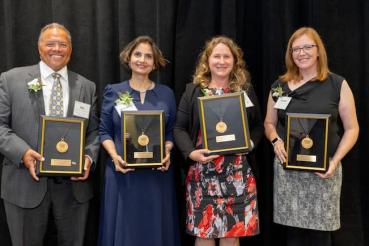“Don’t mess with old nurses,” says Sarah Ailey, PhD, APHN, FAAN, laughing. “We tend to have a track record.”
Ailey, a professor in RUSH College of Nursing’s Department of Community, Systems and Mental Health Nursing, is good-naturedly discussing the success she and her coinvestigators have achieved in obtaining major research grants. That’s just part of Ailey’s long and impressive string of accomplishments in improving health outcomes for people with disabilities (PWD), particularly intellectual disabilities (ID) and developmental disabilities (DD).
Ailey is principal investigator in a five-year grant from the Administration for Community Living, part of the U.S. Department of Health and Human Services, to build a national cross-sector consortium addressing the lack of content about individuals with ID and DD interprofessional health curricula. Along with St. John Fisher Golisano Institute for Developmental Disability Nursing, the University of Illinois at Chicago, the University of Minnesota Institute on Community Integration and Villanova University, RUSH is one of five core partners in PATH-PWIDD (Partnering with Persons with Intellectual and Developmental Disabilities to Improve Health Outcomes), the program receiving the grant.
Via its three action networks — communication, measurement, and education practice and policy — the PATH-PWIDD program used the first three years of the grant to develop materials now being piloted by nine institutions, including RUSH in partnership with Ada S. McKinley Community Services. “We’re a bit ahead of the game, and in years four and five, we’ll be disseminating our content broadly,” Ailey says.
A personal interest
Ailey’s research and clinical interests grew out of the challenges her son, now 47, faced as a child with an intellectual disability. “Being around things like the Special Olympics and dealing with school personnel, you start to see how poorly people with ID are treated,” she says. Ailey decided to go back to school to try to make a difference in the PWD community. At the University of Illinois at Chicago, she went straight up the nursing education ladder, earning her BSN, MS and PhD. She also formed strong, ongoing professional relationships with many UIC nursing faculty—some of whom, like her, later came to RUSH and still partner with her.
Many years later, though incremental improvements are occurring, “The health care system is still entirely ableist,” says Ailey, who is immediate past president of the Alliance for Disability in Health Care Education. “One study found that less than 60 percent of physicians were strongly willing to have PWD in their practices. It’s shocking to me that neither medical education nor nursing education has any requirements for educating students about PWD, who are 25 percent of the population.”
Beyond her involvement with PATH-PWIDD, Ailey is taking aim at these shortcomings with her involvement in numerous other programs and connections. Through a recently concluded R01 grant from the Eunice Kennedy Shriver Institute, she coinvestigated the effect of a program called STEPS (Steps to Effective Problem Solving) in group homes. “STEPS had been used with some success in forensic and clinical settings for people with ID,” she says. “We wanted to look at how problem-solving for people with ID and staff might work in group homes, where one person’s behaviors have an effect on everybody.” The investigators are currently analyzing the data from the study, with a journal article in the works.
“The health care system is still entirely ableist. One study found that less than 60 percent of physicians were strongly willing to have PWD in their practices."
With funding from the Agency for Healthcare Research and Quality, she helped create and host the PATH-PWD national invited conference in 2017. “A whole series of recommendations came out of the conference,” she relates, noting that fully one-fifth of the event’s attendees were PWD.
Funding from that conference helped produce a widely viewed documentary, None of Us Want to Stand Still.
And her advocacy extends past patients with disabilities to include future nurses who are PWD: Ailey coauthored a white paper on inclusion of students with disability in nursing education for the California Committee on Employment of People with Disabilities.
An inclusive approach
A common thread in Ailey’s work is the belief that health care change happens when people in academics, government, public policy, private practice and the patient community work together. That’s why PATH-PWIDD makes extensive use of social media, including X, formerly Twitter, Instagram and Facebook under the name IDD Health Equity, and why content on its site is written for diverse audiences.
“We try to take as broad as perspective as possible,” Ailey says, explaining that to effect meaningful improvement in health outcomes for PWD, “you have to have advocates everywhere.”




